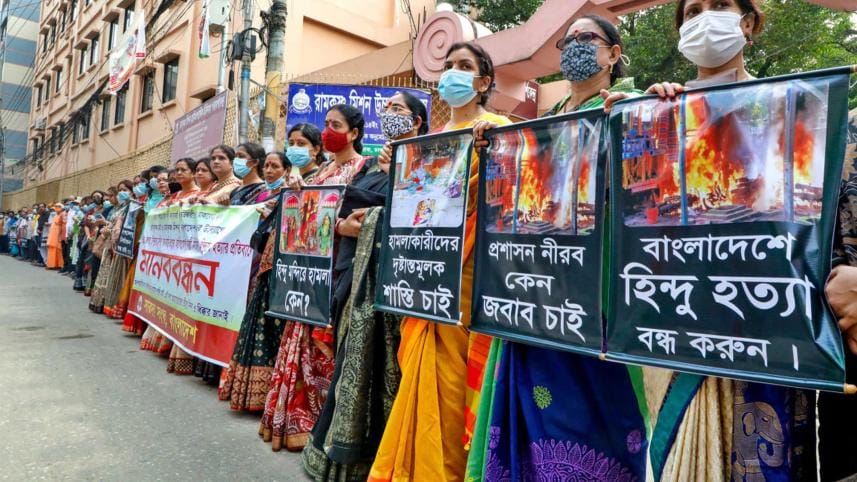The poisonous politics of communalism

While commenting on the unfortunate and shameful incidents triggered by the alleged desecration of Islamic scriptures in Cumilla, this newspaper in its editorial of October 16 very poignantly observed that "what would equally benefit us is to understand the dynamics of communal politics—the powerful forces that keep fanning communal tensions behind the scenes." The editorial very rightly points to the deep damage caused by the senseless zealotry when it says that the Cumilla incident has stoked communal tension temporarily, "but its effect—especially the feeling of trauma experienced by religious minorities, and the chasm among the adherents of different faith groups that threatens to widen with every such incident—is unlikely to fizzle out anytime soon."
The deep wound and frustration caused to the victims of this insanity can be aptly gauged from the wailing of Madhu Kanti Das, a shopkeeper in Lama Bazar, Bandarban, who said, "We have been living together in this area like brothers and friends for 30 long years. We shared our lives—our happiness and sorrows. But within the blink of an eye, these familiar people became strangers." His shop was among the 30 Hindu-owned business establishments that were vandalised and looted on October 14 in Lama upazila. Elsewhere in the country, aggrieved Hindu residents have expressed grave apprehensions about their safety and guarantee of their honourable living in the country.
The Cumilla incident appears to be a ploy designed to commit mischief. While the related inquiry and investigation are expected to unearth the motive and culpability of the planners and perpetrators, it can be said with a fair degree of certitude that no right thinking person of any faith would plant the holy Islamic scripture at a puja mandap. By all accounts, it was a diabolical plan meant to create widespread dislocation, destruction and dissension. Unfortunately, the evildoers have succeeded.
In popular understanding, one can associate religion with the violence in Cumilla and elsewhere in the country but a deeper probe may likely find that it is not religion per se, but the politicisation of religious identity and the exploitation of this identity for community and State ends that result in violence. The emphasis is not on textual analysis but contest for power and resources. Often such incidents are carefully planned and orchestrated and occur within a context of subtle political mobilisation. The criminals at times have committed violence with impunity.
From a historical perspective, it needs to be impressed that the partition of the subcontinent in 1947 was the result of competitive communal politics and embittered sectarian obstinacy. Though in Bangladesh we have paid a heavy price to steer clear of the poison of politics of communalism, it would be less than truthful to say that there is a complete and all-pervasive doing-away with the partition baggage. There are quarters that would deliberately venture to realign State and cultural power in the interest of the majority. The success of such efforts will result in non-Muslims being defined explicitly or implicitly as second-class citizens of Bangladesh. That, quite clearly, would run counter to the constitutional provisions of equality.
We have to remember that the appeal of secularism to religious minorities is very significant because it is identified with the protection of rights including the right to religious freedom. These rights in our constitution are defined both in individual and collective terms. Therefore, the executives in the law enforcement have to be pro-actively stringent in enforcing the rights with a view to ensuring the democratic rights for the religious minorities.
It has to be borne in our minds that, howsoever earnest and eloquent we might appear to be in proclaiming our democratic credentials and peaceful coexistence of all faiths, it is very easy to inflame the passions of gullible folks on the pretext of protecting the sanctity of religion. Events of the present and yesteryears lend credence to such an analysis. Therefore, stern executive and judicial actions to forestall the mischief-makers have to be ensured on a priority basis.
The use and abuse of religion in public life should provide sobering lessons. The main issue before the politicians is to provide appropriate mechanisms to make political integration of minorities possible in a multi-religious society. This has to be a practical endeavour because the recovery of tolerance in the public sphere will have no meaning for those who see themselves as oppressed and discriminated. The aggressive social mobilisation by fundamentalists has to be countered. In addition, public space should be provided for a continuous dialogue among religious traditions and perhaps between the religious and the secular. The aim of such an arrangement is to see if each of the major faiths includes within it an in-house version of other faiths, both as internal criticism and as a reminder of diversity.
Last but not the least, pandering to the religious sentiments and demonising and vilifying "the other" to secure electoral victory and other socio-political gains must be renounced and condemned squarely. The gradual marginalisation of the minorities in the body politic everywhere, including the subcontinent, has to end in public interest.
Muhammad Nurul Huda is a former IGP of Bangladesh Police.




 For all latest news, follow The Daily Star's Google News channel.
For all latest news, follow The Daily Star's Google News channel.
Comments